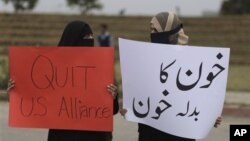ISLAMABAD — Tensions are rising between Pakistan and Afghanistan over deadly cross-border attacks on both sides of the porous border.
Each country accuses the other of harboring militant groups that easily cross the border and launch deadly attacks.
Kabul says the Pakistan military has been shelling areas inside Afghanistan, displacing and killing civilians. Islamabad says it is defending itself from militants who are crossing the border from Afghanistan and killing Pakistani soldiers and civilians.
According to Afghan Foreign Ministry spokesman Janan Mosazai, both governments are discussing the situation. But on Monday he warned that continued rocket attacks from Pakistan would threaten the already fragile relationship between the neighboring countries.
“We have said the continuation of any kind of rocket or artillery attacks on eastern Afghanistan, or any part of Afghanistan, could have a serious negative effect on relations between our countries," said Mosazai.
Pakistani Interior Minister Rehman Malik has accused Afghanistan of harboring a top Pakistan Taliban leader known as Fazlullah. He said the Taliban leader had orchestrated a number of killings inside Pakistan.
Officials representing Afghan and international forces say Pakistan is not doing enough to eliminate Taliban and militant groups like the Haqqani network, which regularly lead assaults inside Afghanistan.
NATO spokesman Brigadier General Gunter Katz said Monday that talks were underway on a regional solution.
“Stability in this region rests on the strength of the partnership of ISAF (International Security Forces - Afghanistan), Afghanistan and Pakistan," he said.
But mistrust between Islamabad and Kabul runs deep.
Analysts in Islamabad have said it appears that neither country is willing nor able to control the militant fighters within their borders.
Rasul Bakhsh Rais, a political science professor at Lahore University, warns that all those involved in Afghanistan will lose if cross-border security issues are not settled before international forces leave.
“If they leave a relationship between Afghanistan [and Pakistan] that is hostile and unfriendly, and where both countries use militant groups as a lever, much of the good work that the international security forces have done will be lost," he said.
NATO’s senior civilian spokesman, Dominic Medley, said Monday the whole aim of the mission in Afghanistan was to leave a secure and stable country that would never again become a safe haven for terrorists.
Each country accuses the other of harboring militant groups that easily cross the border and launch deadly attacks.
Kabul says the Pakistan military has been shelling areas inside Afghanistan, displacing and killing civilians. Islamabad says it is defending itself from militants who are crossing the border from Afghanistan and killing Pakistani soldiers and civilians.
According to Afghan Foreign Ministry spokesman Janan Mosazai, both governments are discussing the situation. But on Monday he warned that continued rocket attacks from Pakistan would threaten the already fragile relationship between the neighboring countries.
“We have said the continuation of any kind of rocket or artillery attacks on eastern Afghanistan, or any part of Afghanistan, could have a serious negative effect on relations between our countries," said Mosazai.
Pakistani Interior Minister Rehman Malik has accused Afghanistan of harboring a top Pakistan Taliban leader known as Fazlullah. He said the Taliban leader had orchestrated a number of killings inside Pakistan.
Officials representing Afghan and international forces say Pakistan is not doing enough to eliminate Taliban and militant groups like the Haqqani network, which regularly lead assaults inside Afghanistan.
NATO spokesman Brigadier General Gunter Katz said Monday that talks were underway on a regional solution.
“Stability in this region rests on the strength of the partnership of ISAF (International Security Forces - Afghanistan), Afghanistan and Pakistan," he said.
But mistrust between Islamabad and Kabul runs deep.
Analysts in Islamabad have said it appears that neither country is willing nor able to control the militant fighters within their borders.
Rasul Bakhsh Rais, a political science professor at Lahore University, warns that all those involved in Afghanistan will lose if cross-border security issues are not settled before international forces leave.
“If they leave a relationship between Afghanistan [and Pakistan] that is hostile and unfriendly, and where both countries use militant groups as a lever, much of the good work that the international security forces have done will be lost," he said.
NATO’s senior civilian spokesman, Dominic Medley, said Monday the whole aim of the mission in Afghanistan was to leave a secure and stable country that would never again become a safe haven for terrorists.





